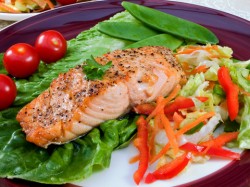 What if the fountain of youth were in your own kitchen? While we’ve come to expect that certain physical and mental changes are an inevitable part of getting older, the fact is that the foods we eat—or don’t—may speed those processes along, aging us before our time. These inadequacies can result in symptoms we tend to assume are due to aging, such as the examples below. Work with your doctor to determine whether adjusting your diet or adding a supplement can help you look—and feel—younger.
What if the fountain of youth were in your own kitchen? While we’ve come to expect that certain physical and mental changes are an inevitable part of getting older, the fact is that the foods we eat—or don’t—may speed those processes along, aging us before our time. These inadequacies can result in symptoms we tend to assume are due to aging, such as the examples below. Work with your doctor to determine whether adjusting your diet or adding a supplement can help you look—and feel—younger.
If: You Have Less Energy
You May Need More: Vitamin B12
How Your Doctor Knows: Your GP will ask about what you eat, whether you’re getting enough sleep, and the medications you take. If you don’t eat many (or any) meat or dairy foods or take supplements containing B12, you sleep 7 to 8 hours each night, and you’re physically active, odds are good that your low energy is due to a B12 deficiency.
Food Fix: Have two servings of nonfat dairy foods, such as fat-free milk or nonfat yogurt, and 3 to 4 ounces of lean protein daily. Good sources of B12 include seafood such as fish, clams, oysters, and mussels, as well as lean beef and pork, chicken, and fortified cereal.
If: You’re More Forgetful
You May Need More: Omega-3 Essential Fatty Acids
How Your Doctor Knows: A quick review of what you eat is all she needs. “If there’s no fish, walnuts, or freshly ground flaxseed in your diet, and the fats you eat come mainly from meat, you’re not getting any omega-3s,” explains Manuel Villacorta, RD, an American Dietetic Association spokesperson in San Francisco.
Food Fix: First, reduce the amount of refined and processed foods you eat as much as possible, and cook with olive or canola oil. Then, eat 3 ½ounces of wild salmon and 3 ½ounces of herring, sardines, or halibut each week. Add 2 tablespoons of freshly ground flaxseed to cereal, whole grain side dishes, or shakes daily, and garnish salads or cereal with 1 tablespoon of walnuts 5 days a week. Finally, enjoy 9 to 12 almonds 4 times a week.
If: Your Blood Pressure Is Rising
You May Need More: Potassium
How Your Doctor Knows: A review of your diet reveals all your GP needs to know. If there’s any doubt, he can evaluate your cardiovascular function with blood tests to check blood sugar, cholesterol levels, and kidney function, along with stress tests, body-fat measurements, and ultrasounds of your heart and arteries.
Food Fix: Cut your sodium consumption to no more than 1,500 mg per day, and eat seven to nine servings of fruits and vegetables every day.










